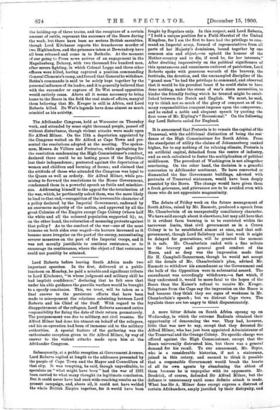Subsequently, at a public reception at Government Avenue, Lord Roberts
replied at length to the addresses presented by the people of Cape Town and the Mayor and Councillors of that city. It was tempting, he said, though unprofitable, to speculate on "what might have been" had the war of 1881 been carried to what many thought its legitimate conclusion. But it could never have had such wide-reaching results as the present campaign, and, above all, it could not have welded the whole British Empire together, for it would have been fought by Regulars only. In this respect, said Lord Roberts, "I hold a unique position for a Field-Marshal of the United Kingdom, for I am the first to have had the privilege to com- mand an Imperial army, formed of representatives from all parts of her Majesty's dominions, bound together by one common aim and object,—to uphold the honour of the Mother-country and to die, if need be, for her interests." After dwelling impressively on the political significance of this spontaneous and unanimous outburst of patriotism, Lord Roberts spoke with generous warmth of the bravery, the fortitude, the devotion, and the unexampled discipline of the " grand men " he had the privilege to command, and observed that it would be his proudest boast if he could claim to have done nothing, under the stress of war's stern necessities, to hinder the friendly feeling which he trusted might be estab- lished between the Dutch and English. We must, he said, try to think not so much of the glory of conquest as of the many responsibilities conquest imposes upon the conquerors ; and he ended a noble and eloquent speech by quoting the first verse of Mr. Kipling's " Recessional." On the following day Lord Roberts sailed for England.














































 Previous page
Previous page